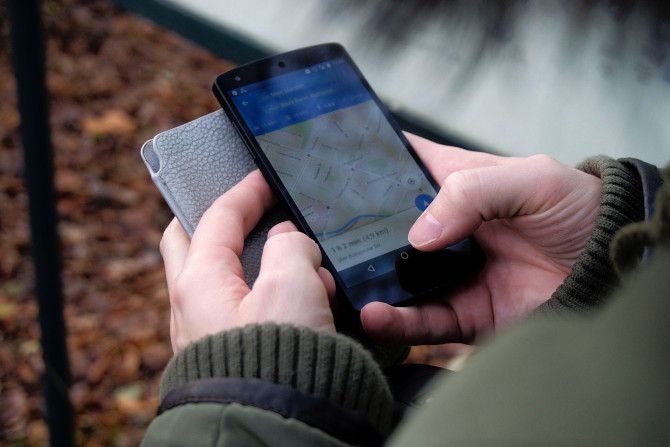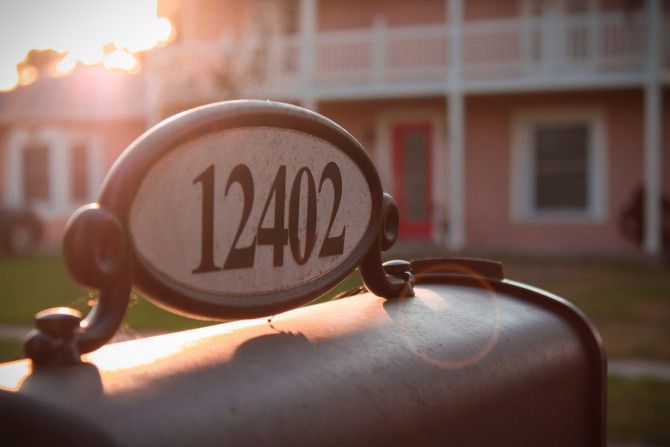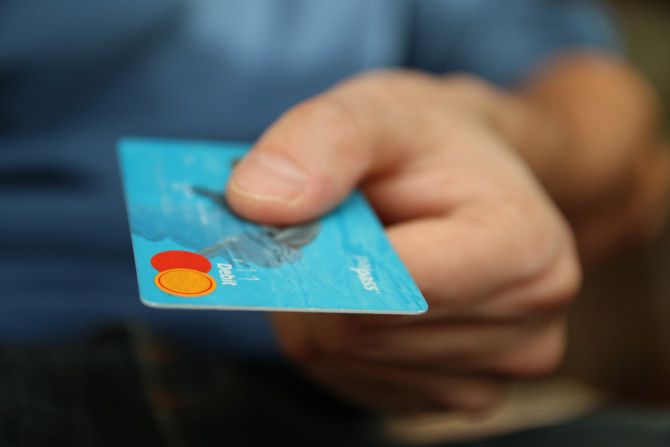When I Upload a Bank Statement Can I Blur Out Information?
We spend increasing amounts of time online and certificate our lives through piece of work and social apps. Networks like Instagram, Facebook, and Twitter are digital public spaces, while work apps like Slack, Zoom, and Google Docs help united states of america work remotely.
With so much data posted online, nosotros inevitably share personal details. These range from the mundane through to the confidential. Information technology'southward not always articulate what you shouldn't post online, and so we're here to help.
Here are five types of information you should never share online.
1. Location

There are two types of location data to remember virtually; data yous choose to post (active) and information that is gathered by your apps and devices (passive).
We have a option of whether to post our active location. Checking in on Facebook, tagging a photo on Instagram, or tweeting with our location on is optional.
It's best not to postal service personal places like your home address. Equally, photo sharing can expose your location, likewise. A shot from your home looking outside may give abroad a notable landmark or street sign which can identify your address.
Passive information collection is washed without your input, though. Virtually of this information goes to a company without being posted publicly. If this is an app or business that you trust to handle your information, yous may experience comfortable with that.
However, information technology'south worth taking the time to check app permissions and read through the site's privacy policy.
What You Can Do
- Check privacy settings on social networks
- Disable automatic location tagging for status updates or tweets
- Don't check-in at your domicile
- Bank check image background for identifiable landmarks
- Read privacy policies to see what an app or service will do with your location data
- Remove EXIF information from photos
- Change Camera settings not to store location information
2. Addresses & Telephone Numbers

Our abode address and phone number are among our most guarded personal items. It's non likely you'd knowingly share this information outside of those who need to know it. That said, there may be times you accidentally expose it.
For example, you lot may take a photo of your mail service, but blur out the accost. However, the post barcode stamped on the front end really has your address encoded in it. The same is true of airline and most pre-booked send tickets. Online registrations frequently ask for your telephone number, too.
Sometimes, this serves a legitimate purpose, like contacting you lot about commitment. Withal, about sites and apps don't require this data. Such services may misuse your phone number for spam or harassment. Providing personal data unnecessarily also increases the damage caused when a site gets breached.
If you're forced into providing your phone number, you can utilise a service like Hushed to create a temporary phone number, instead.
What You Can Exercise
- When submitting personal information online, expect for HTTPS in the URL
- Don't mail service your address in public forums similar Reddit, Twitter, Instagram, or craigslist
- If meeting someone from craigslist choose a public place for security and to prevent giving away your address
- Redact or blank out address from images earlier posting, along with mail carrier barcodes
- Install a temporary burner phone app like Hushed
three. Identification, Credit Cards, and Banking

Identity theft is one of the most stressful experiences. You could be locked out from your bank business relationship, utilities, credit cards, and other essential services. However, you can take reasonable precautions to protect your accounts.
There is never a practiced reason to share images of your IDs, financial information, or bank cards online---peculiarly without redacting confidential items commencement. Unfortunately, you'd exist surprised just how many people do this, even somewhere every bit public equally Instagram or Twitter.
What You Can Do
- Don't mail images of confidential, personal financial information, or IDs online
- If you take a legitimate reason to post, redact or blank out all sensitive information
iv. What Happens at Piece of work, Stays at Work

Work and personal lives tend to mistiness; especially now we tin can work remotely from our homes and mobile devices. That said, you should aim to keep them as separate as possible.
Daily stresses---whether a coworker, boss, or work project---can wear you down. Avoid the temptation to vent on social networks. Non just practice you adventure exposing confidential information, only you lot besides jeopardize your chore.
Even if yous've tweaked all your privacy settings, a simple screenshot could expose your post to people you'd rather didn't see it. This is also true of the content of your work. Working remotely means y'all're likely more comfy than if you'd been in the office.
This relaxation lets our guard down, and we share more online than nosotros intended. Are yous sharing a mail on Instagram of your domicile office? Be sure that none of your work is visible first, whether that's documents, browser tabs, or messaging apps.
The reverse is also true. If yous need to share something with a coworker, be sure any personal data isn't accessible.
For instance, while on Zoom calls, your workspace administrator can see whether you take the Zoom window in focus, which other applications are running on your computer, and, of course, your video stream.
What You Can Do
- Apply lists on social networks to split contacts
- Don't post work projects or other confidential information on social media or messaging apps
- Never take or email documents home unless on a company approved account or device
- Talk through personal frustrations with a friend, rather than work colleague where practical
- Don't criticize the business (electric current or previous) of whatsoever colleagues on a public forum or social network
v. Sentinel What You Say in Digital Public Spaces

Before you attain out to your bank on Twitter, accept a 2d to consider that by publicly displaying your complaint, you link yourself to that establishment, the nature of the complaint, and possibly more.
It'due south not a stretch to imagine that if someone wants to target you, they tin can use this information to contact you, pretending to be the depository financial institution, and potentially lure you lot into giving out more confidential information.
Some might say this scenario is unlikely, just it is possible. Then, you lot should keep it in heed before letting your bank (or other providers) know what's on your heed in a public space.
This isn't limited to finance, either. Following local businesses, interacting with politicians, and sharing complaints all reveal insights into your daily life.
What You Can Do
- Create additional or bearding accounts to interact with customer services on social media
- Do non give specifics publicly; salve these for a private conversation
- Earlier you lot share, consider what kind of information the mail service could give abroad---holiday destinations and dates, home or piece of work location, etc.
- Limit visibility by setting the postal service to individual and update your privacy settings.
In most cases, you lot probably already know not to share confidential information. Still, the constant leak of data also causes problems.
For instance, Reddit allows you to exist anonymous, simply a service similar SnoopSnoo creates a dashboard predicting your marital status, location, almost agile times, and other data.
While information technology's good to exist aware of the data you share, there's no need to be overly worried either. And so long as you are aware, y'all tin have steps to protect yourself. To minimize the risk of being caught out, be certain to protect yourself from information breaches, besides.
Near The Author
Source: https://www.makeuseof.com/tag/information-never-post-online/

0 Response to "When I Upload a Bank Statement Can I Blur Out Information?"
إرسال تعليق